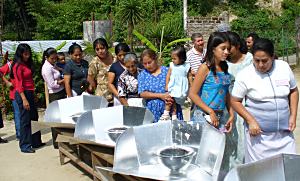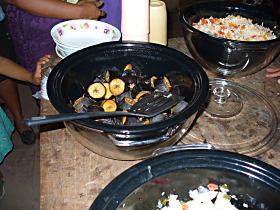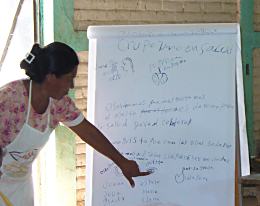
El Salvador HotPot Program
A project of Solar Household Energy, Inc.
In Partnership with El Salvador partners Feed the Children and ACUA
November 2006 — December 2008
Project Context
Undulating mountain ranges dotted with extinct volcanoes, lush, fertile, flat lowlands, and brilliant, blue Pacific waters that lap sparkling, white beaches epitomize the beauty of El Salvador. Yet underneath the beauty, the country is suffering a social and environmental emergency. Today more than 36% of its people live in poverty, the fertility rate is 3.58 children per woman, and the average population growth rate is 2% per annum. El Salvador is the most densely populated country in the Americas and the 41st most populated country in the world, with 282 people per square kilometer. As a result there are extreme pressures on El Salvador’s natural resources making it one of the most threatened ecosystems on the planet.
A significant contributor to the country’s environmental degradation is deforestation: El Salvador has experienced a 94% forest cover loss, has a 4.6% annual deforestation rate, and underground water table levels have been falling one meter per year. A key reason for this level of deforestation is the common practice of cooking with wood which approximately 65% of the population relies on.
Cooking with wood not only stresses the environment, but women and children as well. Women typically cook inside small, closed rooms, which frequently lack windows. Thus women, girls, and young children spend hours every day inhaling toxic smoke. The Salvadoran Ministry of Public Health reports respiratory infections are the top cause of clinic visits for women and children, and the prevalence of respiratory infections among the general public is 42.3%. Additionally, many women and children are severely burned by accidents with cooking fires.
Furthermore, domestic responsibilities including procurement of cooking fuel are shouldered by women and girls. Due to the high deforestation they are forced to venture on 3-4 hour foraging trips up to five times a week, consuming time that otherwise could be spent in income-generating activities or, in the case of girls, attending school. This practice takes a significant physical toll, creating head, neck, and back problems. Where wood no longer exists, there is a significant economic toll as families must purchase imported firewood and/or gas. The average rural family can spend up to 25% of their monthly income on those commodities.

HotPots in use during training, Feed the Children, El Salvador, November 2006
Benefits of Solar Cooking
While cooking with the sun cannot entirely replace other means of cooking, in many climates it can significantly reduce use of traditional and unsustainable fuels such as wood, which is associated with deforestation, respiratory diseases, glaucoma, and burns. By reducing reliance on firewood (and the foraging that its collection often requires), solar cooking provides greater time and energy for other activities. Also, unlike cooking over a fire, charcoal, or gas stove, which requires frequent stirring to keep food from burning, solar ovens need an adjustment every hour or two, according to the path of the sun. Furthermore, the energy source is inexhaustible and costs nothing.

Solar cooked plantains, rice, and casserole ACUA, El Salvador, November 2006
There have been numerous solar cooking projects in various developing countries in the past few decades that have demonstrated the advantages of solar cooking, particularly to poor communities: reduced use of fuel wood, gas, and charcoal; reduced spending on fuels; decreased exposure to smoke, ash, and flames (and associated health impacts); and less time and energy spent collecting fuel. In an evaluation of 180 households in a Somalian refugee camp in Ethiopia, for instance, 94.3% of households used their solar cooker in combination with other cooking methods and exclusive use of wood-burning stoves dropped from 75% among these households to only 3.3% afterwards [ “Lasting Impacts of Solar Cooker Projects,” Melanie Szulczewski, Ph. D., June 2006].
Project Overview
In collaboration with in-country organization partners, Solar Household Energy is implementing a two-year initiative to introduce solar cooking to communities in El Salvador with the goal of reducing pressure on the environment and increasing the quality of life. The project will contribute to:
- An understanding of the long-term potential for reducing deforestation and carbon dioxide emissions in El Salvador;
- A decrease in health problems associated with respiratory infections, burns, and head, neck, and back problems;
- A decrease in gastrointestinal diseases (by teaching water pasteurization);
- More time for women and girls to participate in activities other than fuel wood gathering and cooking that are educational or income-generating; and
- An increase in household savings.
In total, the initiative will focus on eight communities, with a total population of approximately 15,000 people, and distribute 800 “HotPot” solar cookers.
Our Partners
Feed the Children works in five communities in El Salvador to implement programs that provide basic necessities of food, medicine, and clothing, as well as development programs to address root causes, including those that focus on nutrition, agriculture, and gender equity.
Asociacion Comunitaria Unida por el Agua y la Agricultura (ACUA) has programs in three communities to promote environmental conservation through the innovative adoption and adaptation of technology to improve food production, protect water resources, and reduce health risks. The organization works to promote gender equality, citizen participation, community empowerment, and a holistic balance between humans and nature.
 The communities with which Feed the Children and ACUA work are relatively close to the capital, San Salvador, in the departments (states) of La Libertad and San Salvador, along the broader coastal region of the country. They have been greatly impacted economically and socially by the civil conflict in El Salvador. They have also been subject to drought, famine, and flooding. The majority of the families in these communities practice subsistence farming or fishing, and earn money working as vendors, peddlers, domestic workers, or coffee crop harvesters. However, unemployment is high and household incomes range from $120 — 250 per month.
The communities with which Feed the Children and ACUA work are relatively close to the capital, San Salvador, in the departments (states) of La Libertad and San Salvador, along the broader coastal region of the country. They have been greatly impacted economically and socially by the civil conflict in El Salvador. They have also been subject to drought, famine, and flooding. The majority of the families in these communities practice subsistence farming or fishing, and earn money working as vendors, peddlers, domestic workers, or coffee crop harvesters. However, unemployment is high and household incomes range from $120 — 250 per month.
We expect that at the end of the project 800 women from these communities will have mastered solar cooking skills and will be consistently using solar as means of supporting the cooking needs of their families, a total of approximately 4,500 community residents. This will result in reduced use of wood and gas, fewer health problems, and money saved or reallocated from wood and gas costs.

Trainee presents her ideas about the HotPot to her peers at the ACUA training session. El Salvador, November 2006
The El Salvador initiative is directed by Camille McCarthy, Solar Household Energy’s Director of Latin American Programs. She holds an MA in International Development with an emphasis on the nexus between environmental and women’s issues. Due to her Peace Corps service in El Salvador, she has highly relevant experience with sustainable development, environmental protection, and women’s empowerment. Additionally, Camille has worked with foreign governmental ministries and international NGOs.



